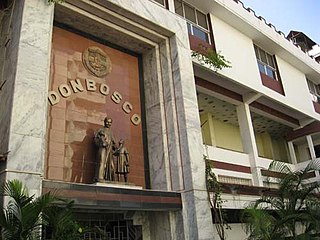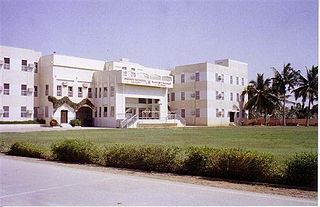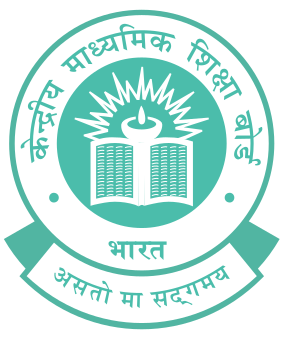Secondary education covers two phases on the International Standard Classification of Education scale. Level 2 or lower secondary education is considered the second and final phase of basic education, and level 3 (upper) secondary education is the stage before tertiary education. Every country aims to provide basic education, but the systems and terminology remain unique to them. Secondary education typically takes place after six years of primary education and is followed by higher education, vocational education or employment. In most countries secondary education is compulsory, at least until the age of 16. Children typically enter the lower secondary phase around age 11. Compulsory education sometimes extends to age 19.

Education in India is primarily managed by state-run public education system, which fall under the command of the government at three levels: Central, state and local. Under various articles of the Indian Constitution and the Right of Children to Free and Compulsory Education Act, 2009, free and compulsory education is provided as a fundamental right to children aged 6 to 14. The approximate ratio of public schools to private schools in India is 7:5. Major policy initiatives in Indian education are numerous. Up until 1976, education policies and implementation were determined legally by each of India’s constitutional states. The 42nd amendment to the constitution in 1976 made education a ‘concurrent subject’. From this point on the central and state governments shared formal responsibility for funding and administration of education. In a country as large as India, now with 28 states and eight union territories, this means that the potential for variations between states in the policies, plans, programs and initiatives for elementary education is vast. Periodically, national policy frameworks are created to guide states in their creation of state-level programs and policies. State governments and local government bodies manage the majority of primary and upper primary schools and the number of government-managed elementary schools is growing. Simultaneously the number and proportion managed by private bodies is growing. In 2005-6 83.13% of schools offering elementary education were managed by government and 16.86% of schools were under private management. Of those schools managed privately, one third are ‘aided’ and two thirds are ‘unaided’. Enrolment in Grades 1-8 is shared between government and privately managed schools in the ratio 73:27. However in rural areas this ratio is higher (80:20) and in urban areas much lower (36:66).

The Mother's International School (MIS) is a private secondary school in New Delhi, India. It is an establishment of the Sri Aurobindo Education Society, an agency of the Sri Aurobindo Ashram. It shares its campus with the New Delhi branch of the Ashram. The school is an English-medium co-educational institution affiliated to the Central Board of Secondary Education (CBSE).

The Atomic Energy Central School is a chain of schools run by the AEES, Mumbai, India, had been developed for the children of employees of the Department of Atomic Energy (DAE), India. The school has 31 branches at 15 locations.

Campion School, Bhopal is a private Catholic primary and secondary school for boys located in Bhopal, in the state of Madhya Pradesh, India. The school was founded by the Jesuits in July 1965 and is one of the oldest schools in Bhopal. Campion School is affiliated with the Central Board of Secondary Education (CBSE), and is among the best schools in the city, ranked as the best Boys Day School in Madhya Pradesh in a 2019 ranking by Education World India. Its campus is spread over 49 acres (20 ha) in the locality of Arera Colony.

The Indian High School is a CBSE-affiliated Indian school in Dubai, United Arab Emirates. It was established in 1961 to provide education to the children of Indian expatriates, the first expatriate educational institution there. The school is one of a small number of not-for-profit schools in the emirate, and is rated "VERY GOOD" by United Arab Emirates's (KHDA). It is the oldest, largest and the leading educational institution in the Gulf region.

Education in Ethiopia was dominated by the Ethiopian Orthodox Church for many centuries until secular education was adopted in the early 1900s. Prior to 1974, Ethiopia had an estimated illiteracy rate well above 90% and compared poorly with the rest of Africa in the provision of schools and universities. After the Ethiopian Revolution, emphasis was placed on increasing literacy in rural areas. Practical subjects were stressed, as was the teaching of socialism. By 2015, the literacy rate had increased to 49.1%, still poor compared to most of the rest of Africa.

The International Indian School Jeddah, formerly known as the Embassy of India School, is an elementary and secondary school for the children of Indian nationals in Jeddah, Saudi Arabia, with boys and girls taught separately in English. It was founded in 1969.

Don Bosco Senior Secondary School is a school located in Guwahati, Assam. It is a Catholic school founded on the teachings of Saint John Bosco, and is run by the Salesians of Don Bosco. Started in 1948, Don Bosco is one of the leading private schools in the North-Eastern states. It currently operates 12 standards, divided into primary, middle, senior and senior secondary sections. The school is managed by a Principal, with Vice Principals and Teacher-Coordinators operating under him. The school currently houses 3000 students.
The IISR, formerly known as Embassy of India School, Riyadh is an English-medium Indian school located in Riyadh, Saudi Arabia. It is one of the largest Indian schools with close to 9500 students. The students are locally known as "iisrians". The School is part of global International Indian Schools including International Indian School, Dammam, International Indian School Jeddah, International Indian School, Al-Jubail and is affiliated to the Central Board of Secondary Education (C.B.S.E), New Delhi, India and is licensed under the Ministry of Education, Kingdom of Saudi Arabia. The School endeavors to move towards fulfillment of above goals under the patronage and guidance of His Excellency Ahmed Javed, Ambassador of India to the Kingdom, and the Patron of the school.

The Indian School Salalah is an Indian-run, self-financing, co-educational institution, primarily established to meet the academic needs of children of Indian expatriates working in the Sultanate of Oman in the Persian Gulf. The school also admits children of other nationalities. The school is located in the Dahariz area, of Salalah town, in the southern governorate of Dhofar.

The Central Board of Secondary Education (CBSE) is a national level board of education in India for public and private schools, controlled and managed by Union Government of India. There are approximately 21,271 schools in India and 220 schools in 28 foreign countries affiliated to the CBSE. From 309 schools in year 1962, as on year 2019, CBSE has 21,271 schools and 228 schools in 25 foreign countries. All schools affiliated to CBSE follow the NCERT curriculum.

Delhi Private School, Dubai is a CBSE curriculum, private, co-educational day school located in Jebel Ali, Dubai, United Arab Emirates.

Al Noor International School is a selective private school in Bahrain founded on September 6, 1993, by private investors. The school teaches over 3000 students from more than 40 countries, mainly the United States, the United Kingdom, Bahrain, India, and Pakistan. It started with a programme of classes for primary levels in the district of Mahooz, prior to its relocation to the island of Sitra. It currently houses the educational needs of students from over than 40 countries and follows a curricular program made up of three types: British, Indian, and Bahraini.
The Al-Ameer English School is an English medium school that was founded in 1991 in Ajman, United Arab Emirates. The school is accredited by Central Board of Secondary Education, New Delhi and has the recognition of the U.A.E.'s Ministry of Education.
Central Hindu Girls School, also known as C.H.G.S and Girls School, is a girls secondary school in Gurubagh, Bhelupur, Varanasi (India). It was established in 1904 by Dr. Annie Besant.
Avalon Heights International School is a coeducational secondary school located in Vashi, Navi Mumbai. It is affiliated to the Indian Certificate of Secondary Education (ICSE) and was established in 1998. The school has over 1200 students and is located near APMC Market in Navi Mumbai.

Global Indian School is a private Indian K-12 school in Ajman, United Arab Emirates, established in 1988. The school is recognized by the UAE's Ministry of Education and affiliated with the Central Board of Secondary Education in New Delhi, India.














